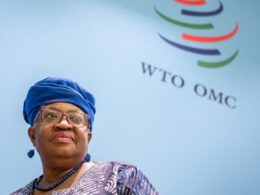Unlock the Editor’s Digest for free
Roula Khalaf, Editor of the FT, selects her favourite stories in this weekly newsletter.
The US is eyeing a multibillion-dollar slice of Britain’s pork, poultry, rice and seafood sectors, as it looks to expand its trade agreement with the UK, Donald Trump’s agriculture secretary said on Tuesday.
Brooke Rollins said these sectors were “at the front of the line” in ongoing negotiations to build on the trade deal announced last week, which gave US beef and bioethanol producers expanded access to the UK market.
The US has touted the deal as a $5bn opportunity for American farmers, ranchers and producers. But the initial text of the agreement only covers about $950mn of trade in hormone-free US beef and ethanol.
“Certainly pork and poultry are at the front of the line, along with rice and seafood,” Rollins said at a press conference in London on Tuesday, when asked about further products under discussion.
She added: “Food security is national security. The UK, for example, really relies on China and Russia for your seafood. America has extraordinary best-in-class seafood. Let’s talk about that.”
The remarks are likely to stir concern among British farmers and food producers, who have already raised alarms about potentially being undercut by cheaper US imports that may not meet UK or EU production standards.
The UK has high tariffs on many agricultural products including up to 72 pence per kilogramme on pork, 107p on poultry, and 18 per cent on shrimp.
“We are more than happy to compete on a like-for-like basis,” said Richard Griffiths, chief executive of the British Poultry Council. “But if we allow imports that are produced to standards beneath ours, that’s unfair competition.”
Rollins suggested that some US exporters would adjust to meet British expectations, in a softening from last week when she said that no industry had been “treated more unfairly than our agriculture industry”.
While she defended the safety of hormone-treated beef and chlorinated chicken on Tuesday, she said beef producers may be prepared to ditch hormones in order to sell to the UK and stressed that “only about 5 per cent” of US chicken is now washed with chlorine.
American producers “are constantly watching what the markets look like, and if the markets are calling for a specific type, or they have more opportunity somewhere, then I think that we, potentially, do see some movement in the market,” she said.
Griffiths countered that among US producers “it’s standard practice to clean up at the end” with chemical washes — including but not limited to chlorine.
In comparison, he said, British poultry farmers have to promote hygiene throughout the whole process, and can only use water. This is much costlier, he added.
UK ministers have repeatedly insisted that chlorinated chicken and hormone-treated beef would remain illegal in Britain.
Rollins also stressed the reciprocal benefits for UK exporters: “While, in fact, we are excited about getting American beef, ethanol [and] hopefully down the line, rice, seafood, other products are coming into your country, this is also about getting more of your country’s products into ours as well.”
The Department for Business and Trade did not immediately respond to a request for comment.
Source link









